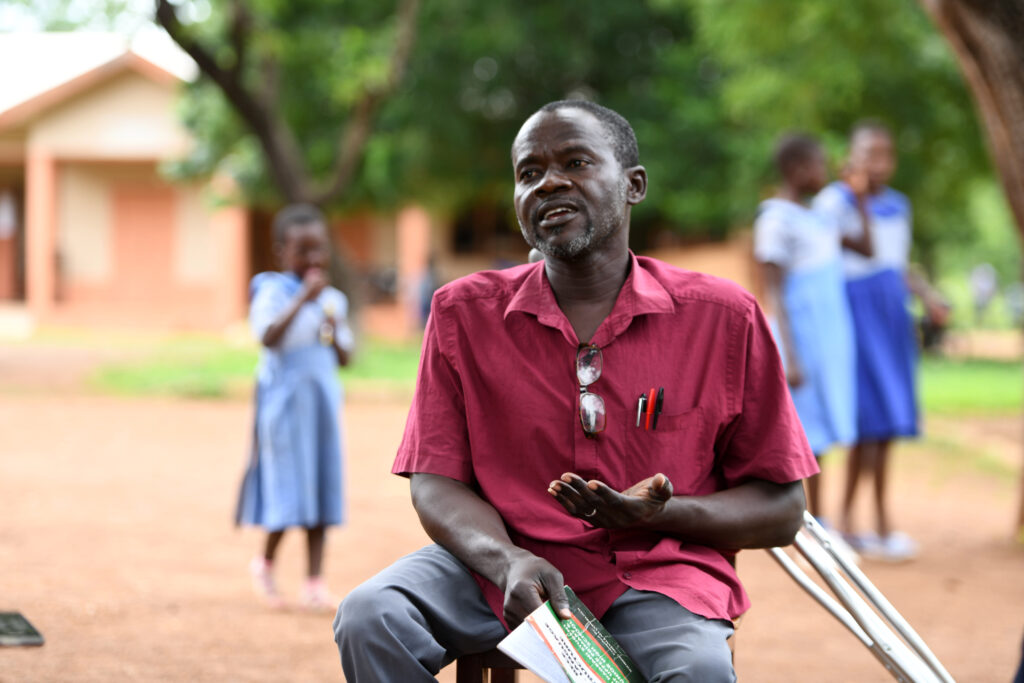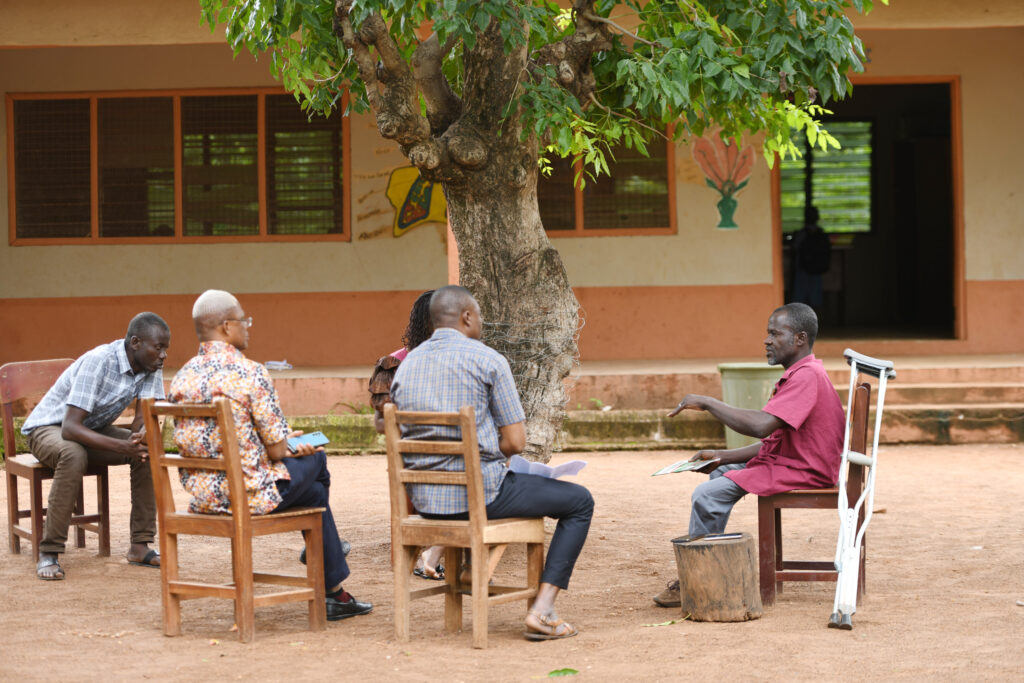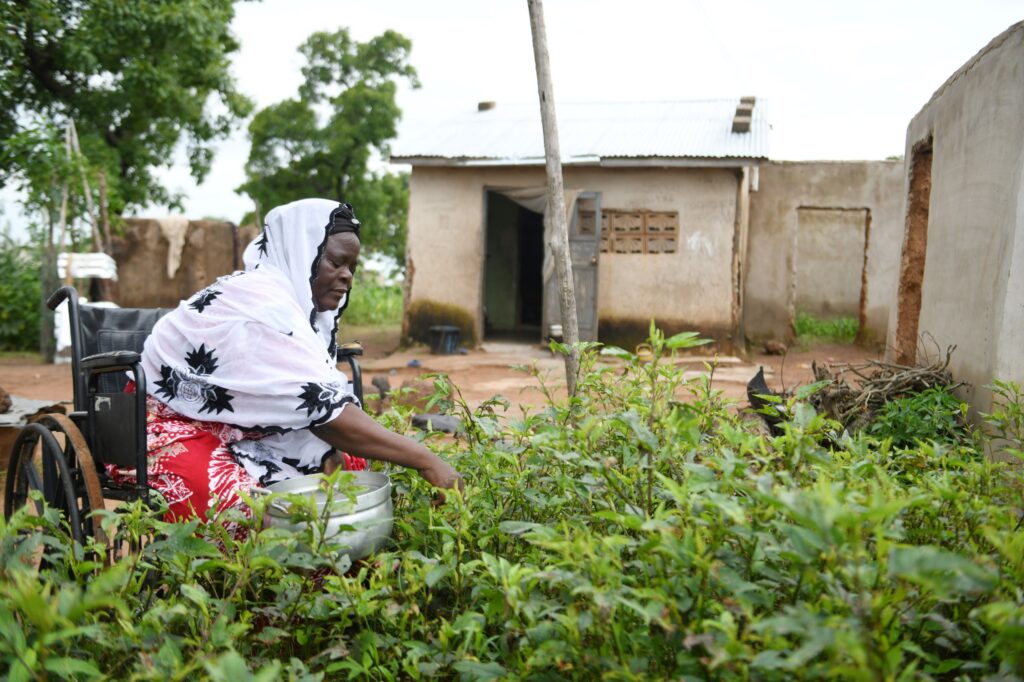Due to bites from infected mosquitoes, Hafsah Alhassan used to end up in the hospital with malaria three or four times a year. The 45-year-old lives in Ghana’s Northern Region. She also happens to get around in a wheelchair after having had both her legs amputated.
Four years ago, Hafsah moved to a district that does annual indoor residual spray (IRS) campaigns to apply long-lasting insecticide on the walls of homes to kill malaria-transmitting mosquitoes. Since then, her hospital visits have dropped to maybe once a year, if at all.
“I used to spend a lot of money on malaria, so we were relieved when IRS was introduced when we came to live here,” she says.
Now she is a community champion, wanting everyone to know the benefits. These days, when Hafsah visits the local mosque, she shares her experiences with IRS with other women, hoping to motivate them to participate in the program and see IRS as a source of protection against malaria for themselves and their children. Her efforts do not just save lives; preventing malaria also enables children to stay in school and adults to work and support their families.
Hafsah is one of the more than three million people in Ghana living with a disability — and like the rest of the country — they are all at risk of getting sick with malaria from the bite of an infected mosquito. Due to limited data, there are concerns that people with disabilities might not have access to the resources needed to protect themselves from malaria.
To address this potential inequity, the U.S. President’s Malaria Initiative (PMI) is working with Ghana’s National Malaria Elimination Program and local organizations in the Northern Region to gather data from the districts on the total number of persons living with disabilities who need access to tools to prevent malaria. This will allow PMI’s VectorLink project to work in tandem with regional officials and the disability associations to ensure access to the malaria-prevention tools for all people living with disabilities in communities where the project is conducting IRS in March of 2023.
One of these local organizations is the Kumbungu Association for the Disabled, which works with Ghana’s Department of Social Welfare to register persons with disabilities for the national health insurance program. They also facilitate registration for access to healthcare services including malaria services.

Zakaria Alhassan, head of the Kumbungu Association for the Disabled, at the local school where he teaches. Photo credit: Geoffrey Buta
Association president and local school teacher Zakaria Alhassan estimates that there are 1,400 people living with disabilities in the district, out of a total population of 110,586. The association works to ensure that its members, especially women who are pregnant and male members’ wives who are pregnant, receive bed nets or have their homes sprayed to stay safe from malaria-carrying mosquitoes. Members participate in district stakeholder meetings to help plan spray campaigns, and within their own gatherings the association urges its members to take part in the campaigns. Zakaria notes that all members of the association, including himself, have had their homes sprayed.
Zakaria, like Hafsah, says the IRS has helped protect him from contracting malaria.
“I used to go to the hospital almost every year during the rainy season because of malaria. My first born was attacked by malaria, and we spent weeks in the hospital,” he says. “When I started giving the opportunity for the sprayers to spray my house, it did a lot. It has been three years now that I have not experienced malaria.”

Zakaria Alhassan ( far right), discusses malaria interventions with staff from PMI VectorLink. Photo credit: Geoffrey Buta
Zakaria’s experience turned him into an advocate for IRS in his community. “When we moved to another neighborhood,” says Zakaria, “I [also] encouraged them (the people in the neighborhood) to spray.”
Thanks to advocates like Hafsah and Zakaria and strategic efforts by PMI and the government of Ghana, more people living with disabilities will have access to life-saving tools to prevent malaria, contributing to safer, healthier, and more prosperous communities.
Cover photo: Hafsah Alhassan in front of her house. Photo credit: Geoffrey Buta

